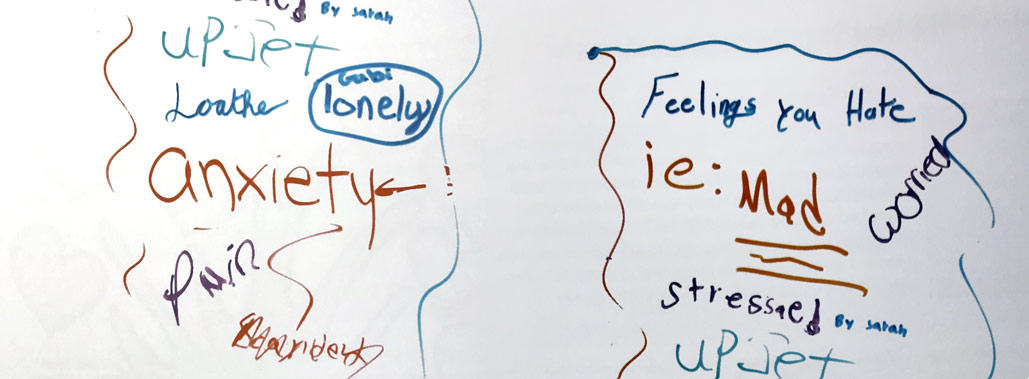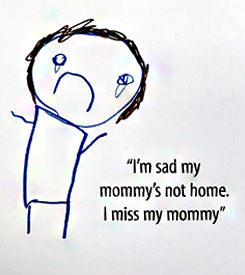
Just because a child is verbal does not mean she has the necessary emotional vocabulary or capacity to explore her feelings around a past traumatic experience.
Jared (Age 6)
Jared and Cooper were brothers. They wrestled and played together every day. Their Mom was always shouting, "Boys, stop it – someone is going to get hurt!"
One night, at bath time, Mom noticed that Cooper had black and blue marks on his body. "What happened?" she asked, "Did you fall?" But Cooper said, "No, I didn't fall."
"You see, I told you someone would get hurt with all that play-fighting you guys do," she said. When the black and blue marks didn't go away, Cooper's parents took him to the doctor. He was diagnosed with leukemia and had to go to the hospital.
Jared was told that Cooper was very sick and going to be in the hospital for a long time. Jared had lots of questions. His parents were so busy taking care of Cooper that they didn't explain things to him, and he was afraid to ask.
Jared was scared and feeling guilty. He wondered: "Did I make Cooper sick?"
Professional Commentary (Abridged)
Play-fighting is a typical interaction between siblings. It is also common for a parent to remind children that someone might get hurt. And, when someone does get hurt, it is not unusual for a parent to say “I told you so.” How best to deal with Jared’s fear and guilt? Staying Afloat can show you.
Chloe (Age 11)
"Chloe...Chloe, wake up! You're having that bad dream again." Chloe woke from her nightmare and found herself wrapped safely in her mother's arms.

It was always the same horrible dream: Chloe and her mom are sitting in a beautiful church. The sun is streaming in and she feels peaceful and safe. She turns to look at her mom, but her mom is no longer next to her.
Chloe starts to feel anxious. Where is her mom? Chloe chases shadows looking for her, but every time she thinks she is catching up, the shadows disappear.
In her dream, Chloe screams and screams and her heart is still pounding as she wakes up.
Chloe's mom soothes her and whispers, "It was just a dream. Everything is okay now."
When Chloe was young, her mom had been very sick.
She remembered when her mom was in and out of the hospital and was too weak to even pick her up. But that was all in the past. Her mom was back to herself now.
Chloe didn't like to think about "the bad time," when her mom would go away to the hospital and Chloe was afraid that she would never come back.
It made her shiver to think of it.
Professional Commentary (Abridged)
Parents often think that they are protecting their children by not talking about the illness. However, this avoidance is potentially very damaging to the child. Just because a child is verbal does not mean she has the necessary emotional vocabulary or capacity to explore her feelings around a past traumatic experience. How can a child be helped to work through these feelings? Staying Afloat can tell you.
Amanda (Age 14)
"Mom – don't ever bring Jackie to school with you again! Do you know how embarrassing it is for everyone to see me with her? Just look at her – strapped in and stuck in that wheelchair."
As soon as she said it, Amanda felt sorry and ashamed.
She knew it wasn't Jackie's fault that she had cerebral palsy, but did everyone have to know that her family wasn't normal? That was the reason Amanda never invited other kids to her house.
She hated the questions and the looks on the other kids’ faces when they saw Jackie.
Why couldn’t she have a normal sister like everyone else?
Amanda hated herself for feeling that way, but she couldn't help it.
And now, on her first day in high school, when she had a chance to have a fresh start and meet new kids, her mother showed up with Jackie.
Professional Commentary (Abridged)
Amanda is filled with guilt because she struggles with embarrassment over her sister's physical appearance and medical condition. She needs to learn to separate her feelings about herself from how people view her sister, so that her self-esteem is not negatively impacted. How does she learn this? Staying Afloat can show you how.
Purchase here:
